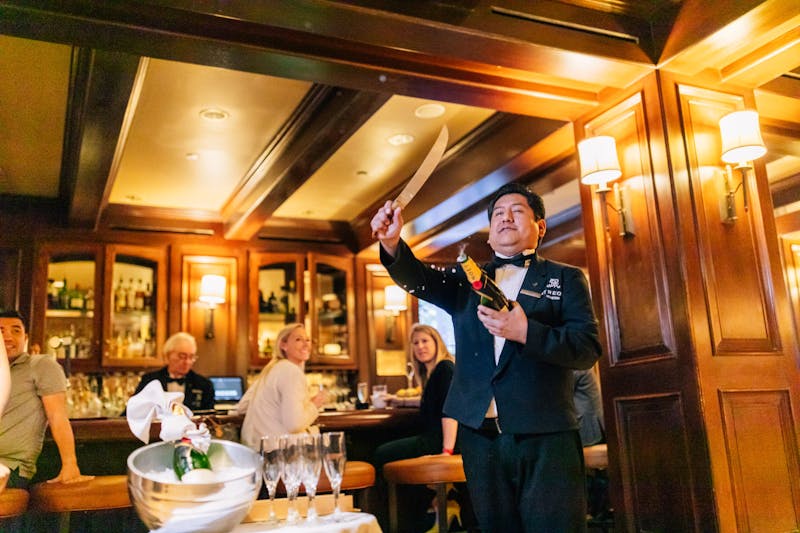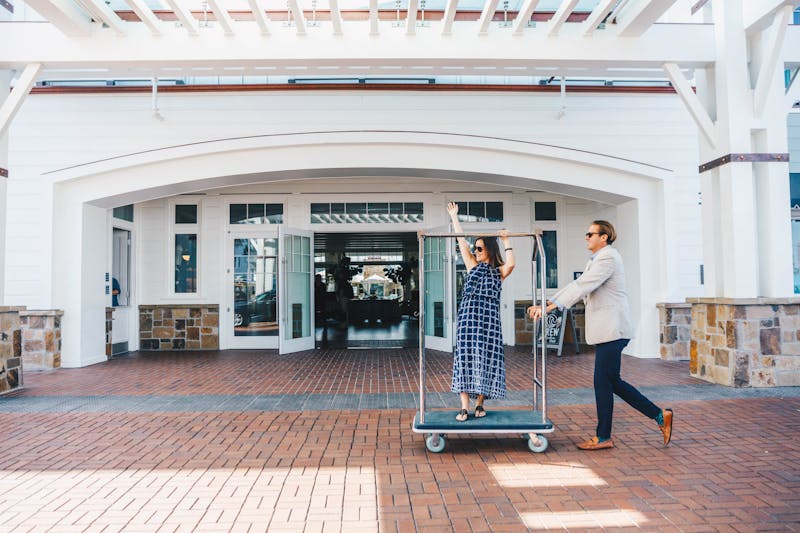You may be surprised to learn thatonly 56%of travel and tourism brands respond to customer messages on social media. These stats, which come from Sprout Social, don’t get any better when you consider that 40% of consumers expect a response within the first hour, and 79% expect that answer in the first 24 hours.
In other words, if your hotel isn’t responding to messages on social media within the first day, you’re disappointing 79% of customers. That’s because the same hospitality they experience in-person, they now expect online. And these expectations extend across categories, with luxury guests expecting rapid responses and high-touch customer service across all channels.
Let’s take a look at the five main reasons that response time matters in hospitality.
#1: RESPONSE TIME INFLUENCES BRAND PERCEPTION
Whether or not you respond to social media messages is one of the most visible aspects of your hotel’s reputation. Since it’s one of the first interactions a potential guest may have with your brand, this visibility makes social touchpoints incredibly influential. That’s doubly true for platforms such as Facebook that bestow a “Very Responsive” badge to those pages that respond to at least 90% of messages received within 15 minutes or less.
Imagine this scenario: a potential guest is evaluating three hotels for an upcoming stay. The guest has an issue: a large vehicle that’s not always easy to accommodate in valet or self-parking options at some hotels. Rather than call each hotel individually, the guest asks each hotel about the parking situation on social media.
One brand responds immediately with a no. The other two don’t respond. But there’s something the first hotel did: they also suggested a sister hotel nearby with a better parking situation – and included a link to their booking engine. With that simple masterstroke, the hotel took advantage of a sales opportunity, kept a booking away from competitors and earned a commission-less direct booking. The hotel also reinforced its brand reputation for proactive customer service. For luxury hotels, that type of reputation is priceless – and is exactly why response time matters.
That’s why you absolutely need to develop systems that allow your hotel to respond as quickly as possible online. Whether it’s assigning shifts so that there’s always someone available to answer or finding a partner to guarantee 24/7 responsiveness, the rapid response time can be a make-or-break moment for capturing that booking.
Keep in mind that business hours may not be when people are searching for hotels. It’s not always practical for someone to search for a hotel during the typical “9 to 5” workday. Plus, guests may not necessarily be located in your time zone.
You know your typical guests best: make sure that someone can respond to all guest requests across all channels in the time zones (and time frames) most suited to your guest’s preferences. It’s all about the guest experience – and not at all about what’s convenient for your operations.
#2: CONVENIENCE ABOVE ALL – ESPECIALLY POST-COVID
According to recent data from Intercom, there’s been a spike in customer requests during COVID: a near-majority of surveyed support teams experienced a 51% increase in inbound customer communications. This was no different within hospitality with BCV data showing a 25% increase in the average hotel’s online community activity in Q2 2021; the highest volume we’ve seen since Q3 2020.
Most of us became quite familiar with the “we’re experiencing high call volume” messages, resulting from layoffs and furloughs that put fewer agents in charge of more calls. Since people couldn’t go into physical retail locations and were using social media more often, those requests migrated to social platforms. And it turns out that people like being able to message, chat and text with brands online.
Post-pandemic, that behavior isn’t likely to change. Customers are comfortable with omnichannel communications with brands, taking to whichever channel is most convenient to make their requests. Another added layer of complexity: customers are switching channels too, expecting information to flow seamlessly across customer support to ensure that any agent can pick up where another left off, regardless of channel.
Also, many customers are savvy enough to understand how chatbots and other messaging platforms work. There’s a growing frustration when a customer chats with a brand, asking a simple question like “When do you close,” only to receive a message saying, “We’ll get back to you in 1-2 business days.” There’s no excuse for not leveraging some level of automated responses to your most frequent questions. Consumers want the information they need, quickly, whenever they want it, and on any channel they choose.
#3: UNRESPONSIVE BRANDS PUSH CUSTOMERS AWAY
Circling back to the example of the individual who’s looking for a place to stay that can accommodate an oversized vehicle, think of how one rapid response can secure the booking. What would have happened if none of the three hotels had responded to the social message? The potential guests would have continued to research other options.
That’s another critical aspect of social responsiveness: customers are less loyal than they were before COVID. McKinsey calls this the “shock to loyalty.” Every minute delay in response gives the potential guest more time to research options and book a stay elsewhere. So, even if you have a loyal customer who prefers to book with you, you can’t rely on that loyalty to provide patience.
Then there’s the long-term impact of providing that negative touchpoint. If a customer was previously loyal, and now they’ve booked with a competitor, the poor response time may be just enough to push them away for good. Customers are fickle and often purchase due to force of habit. By breaking the bond of habit, you’ve potentially pushed a valuable customer into the arms of the competition.
#4: SOCIAL SUPPORT FOSTERS LOYALTY
We don’t need research to tell us that customers are more likely to become loyal when a brand meets or exceeds their expectations. That’s something we all know instinctively as customers ourselves – and see every day in our interactions with our most loyal guests.
The grueling truth is that we, as guest-centric professionals, have to earn loyalty in every interaction. And it’s really easy to wash away years of brand loyalty with one negative experience. So that’s a lot of pressure to get things right, every time.
Even so, your most loyal guests can become even fiercer brand advocates with “surprise and delight” moments that arise due to social media interactions. Perhaps you notice that a guest has inquired about the availability of a room for the weekend and you see that they’re a frequent guest. How much goodwill would you earn if you responded that a room was indeed available – and that you’ve upgraded it to a suite? Social can be a strong loyalty builder.
Social media can also amplify both negative and positive interactions. That’s because many guests will look at how your hotel responds to bad reviews on TripAdvisor or public complaints on Twitter, for example. When they see a thoughtful, thorough, and proactive response, they’ll be more likely to book. So your social responsiveness is a virtuous cycle that can either support or hinder your hotel’s long-term loyalty.
You can also leverage your responsiveness into upsells and upgrades, using what you know about your guests to enhance their experience. This guest-centric approach is how your hotel earns repeat business with consistent, attentive, and responsible customer care.
#5: SOCIAL LISTENING IS A SUPERPOWER
There’s value to staying close to your guest. By keeping your ears close to the ground and fingers on the pulse, you can learn all kinds of things about your guests.
Each inbound request is a learning opportunity: is your website information inaccurate? Could you refresh your FAQ? Is there a whole new demographic that’s interested in your hotel – and that marketing could leverage into a standalone campaign? These are all business-critical insights that can impact your bottom line. In a time when recovery is still fragile – and there’s lots of lost ground to make up on the revenue side – no booking should be taken for granted.
In addition to mining your inbound requests for insights, there’s also the broader benefit of embedding social listening into your daily operation.
As far as what you can monitor, there are some must-haves: your hotel’s name, your website URL, and all of your branded hashtags. Then, you should add your comp set hotels. By monitoring those, you may surface further insights – or even surface opportunities to snag some business by being more responsive.
The most advanced layer beyond that is to set up social listening channels for location-based terms that may signal interest in travel. By proactively monitoring for destination-specific content on social, you can find ways to engage potential guests by being useful: providing travel tips, recommending activities, or even answering “how to get around” questions.
Social listening gives you organic conversation starters that make your brand appear more engaged online. That added perception of responsiveness enhances your reputation and gives you a leg up on your competitors. Use it wisely!
PROACTIVE VS REACTIVE MONITORING
There are two ways to monitor social media: proactive and reactive. Being reactive means that your team only addresses guest issues after the fact. That means that you might only reach out to a guest on social media once their complaint has escalated into a bad review.
So a guest could post to Instagram with the caption “can’t believe how hot my room is,” and then tags your hotel’s location, branded hashtag, and/or handle, and your team misses the opportunity to intervene – and then the guest publishes a (permanent) negative review on TripAdvisor.
The proactive approach means that you’re actively keeping an eye out to catch any potential issues before they snowball. An example of this would be using sentiment analysis to identify negative messages so that your team notices the negative post within minutes of posting.
The social team then escalates it to the on-site team, which then springs into action by informing engineering and calling the guest’s room. In the meantime, the social team responds to the guest in a direct message, apologizing and sharing the plan of action. These are the experiences that earn long-term loyalty – and why response time matters.
THE ALWAYS-ON GUEST EXPERIENCE
Social media is part of the 24/7, always-on guest experience. It’s a facet of our interconnected, omnichannel lives – and it’s here to stay.
Of course, being always on and ready to respond is difficult for most operations. And yet, since social media never takes a break, neither can your customer service. Customers expect a quick response from brands, across all channels.
The payoff for responsiveness is big: it shows guests that you care. Whether it’s a potential guest evaluating their options, a current guest seeking support or a past guest who’s already part of your community, social responsiveness is good business. When considering where to stay, most guests will default to the more customer-centric brand – even valuing responsiveness over amenities.
A hotel that is authentic and responsive online is best positioned to earn business and foster loyal relationships – two profitable pluses when navigating the post-pandemic recovery.



